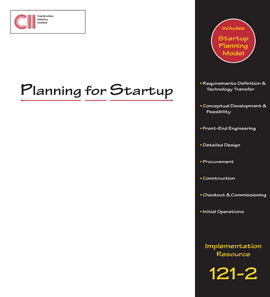
Planning for Startup: Assessment
The importance of startup planning is evident given the challenging characteristics of today’s industrial business environment:
- Pressures to increase profits by reducing costs
- Reduction in owner project staff and increases in outsourcing of services
- Demand for shorter project cycle times
- Lack of planning capabilities and supportive tools.
These business challenges demand increases in organizational efficiency and management effectiveness. As a result, planning and training tools are in high demand.
Definition of Startup
Plant startup is defined as the transitional phase between plant construction completion and commercial operations, including all of the activities that bridge these two phases. Critical steps within the startup phase include system turnover, check-out of systems, commissioning of systems, introduction of feedstocks, and performance testing.
Project Success, Startup Success, and Planning for Startup
Project management and the perception of project success must be aligned with a new paradigm: mechanical completion is not the project objective; successful commercial operations is. Successful commercial operation requires a successful startup. The message is evident—if you want a successful project, you must plan for a successful startup.
Further analysis of startups indicates that there is a reasonably strong correlation between startup success and extent of startup planning. The message is again clear:effective startup planning requires that the right issues be addressed by the right people at the right time.
The 45 startup activities of the Startup Planning Model are complemented with 26 tools across the eight project phases to facilitate the implementation of the startup planning activity. Twenty of these tools focus on the critical areas of front end engineering and detailed design. (IR121-2, p. 9)
Four examples of these 26 tools:
- Tool 1-A-2: Startup Planning Assessment Tool
- Tool 2-C: Startup Financial Risk Assessment Checklist
- Tool 3-I: Checklist of Typical Startup Activities
- Tool 3-C-2: Sample RACI Chart
The research identifies these 6 startup planning gates. The "Quality Gate" concept emphasizes the importance of planning milestones or checkpoints for assessing the thoroughness of startup planning to ensure that all appropriate planning is completed, prior to moving on to the next step of project development. (IR121-2, p. 7)
- Recognizing the impact of startup on project economics
- Updating the startup execution plan
- Finalizing the operations and maintenance organization and management systems
- Check-out systems
- Commission systems
- Finalizing documentation
Everyone involved in startup planning should be aware of the barriers and challenges to effective planning. The research identifies 140 barriers to successful startup grouped into five themes: (IR121-2, p. 9)
- Ineffective communication
- Schedule pressures
- Lack of personnel, information, or other resources
- Denial of potential problems
- Planning efforts applied too late in the process
This implementation resource provides the Startup Planning Model to help plan startups in a more thorough, effective, and efficient manner. It provides full details of the 45 startup planning activities identified by the research team. These activities have been organized by eight typical project phases and are supported with 26 tools.


